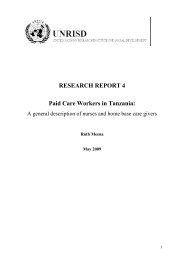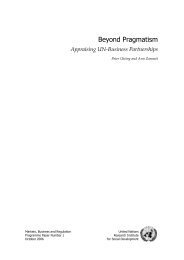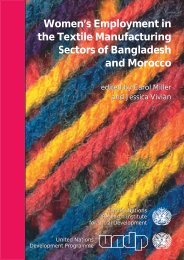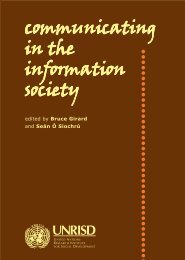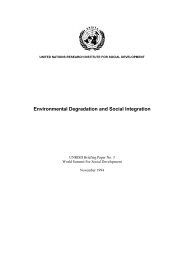The Politics of Gender and Reconstruction in Afghanistan
The Politics of Gender and Reconstruction in Afghanistan
The Politics of Gender and Reconstruction in Afghanistan
You also want an ePaper? Increase the reach of your titles
YUMPU automatically turns print PDFs into web optimized ePapers that Google loves.
THE LEGACIES OF CONFLICT: IS THERE A GENDER SUB-TEXT?<br />
the years <strong>of</strong> exile, <strong>and</strong> is cont<strong>in</strong>u<strong>in</strong>g to play a role <strong>in</strong> lobby<strong>in</strong>g for women’s rights. New economic pressures have<br />
placed some women <strong>in</strong> breadw<strong>in</strong>n<strong>in</strong>g roles. Many have suffered the loss <strong>of</strong> male providers. Others have accessed<br />
jobs through contact with <strong>in</strong>ternational aid agencies that provide new avenues <strong>of</strong> employment. Whereas previously<br />
the government was the pr<strong>in</strong>cipal employer <strong>of</strong> women <strong>in</strong> urban areas, aid-agency efforts to extend<br />
services to women at the rural <strong>and</strong> prov<strong>in</strong>cial levels have exp<strong>and</strong>ed the opportunities for educated prov<strong>in</strong>cial<br />
women to seek employment as health providers, educators or project staff (Azarbaijani-Moghaddam 2004).<br />
Although the longer-term impact <strong>of</strong> these changes is difficult to assess, the advantages <strong>of</strong> harness<strong>in</strong>g women’s<br />
<strong>in</strong>come-earn<strong>in</strong>g power <strong>in</strong> the service <strong>of</strong> household survival are lost on neither urban nor rural communities.<br />
<strong>The</strong> problem, however, is that women’s low levels <strong>of</strong> education <strong>and</strong> skill, their restricted mobility <strong>and</strong> lack <strong>of</strong><br />
access to markets make their <strong>in</strong>come-generat<strong>in</strong>g activities subject to exploitative relationships that <strong>of</strong>fer<br />
limited potential for empowerment.<br />
Currently, rout<strong>in</strong>e violations <strong>of</strong> women’s human rights <strong>in</strong> <strong>Afghanistan</strong> are over-determ<strong>in</strong>ed by <strong>in</strong>dependent but<br />
partially overlapp<strong>in</strong>g <strong>and</strong> mutually re<strong>in</strong>forc<strong>in</strong>g sets <strong>of</strong> <strong>in</strong>fluences: the gendered disadvantages <strong>in</strong>herent <strong>in</strong> the<br />
marriage, <strong>in</strong>heritance <strong>and</strong> daily social practices <strong>of</strong> various ethnic communities are aggravated by the loss <strong>of</strong> the<br />
cushion<strong>in</strong>g effects <strong>of</strong> family ties <strong>and</strong> obligations, which have been eroded through poverty <strong>and</strong> displacement.<br />
When the most vulnerable are left to fend for themselves, they become easy prey to forms <strong>of</strong> exploitation rang<strong>in</strong>g<br />
from debt peonage to human traffick<strong>in</strong>g. <strong>The</strong> dynamics <strong>of</strong> gendered disadvantage, the erosion <strong>of</strong> local livelihoods,<br />
the crim<strong>in</strong>alization <strong>of</strong> the economy <strong>and</strong> <strong>in</strong>security at the h<strong>and</strong>s <strong>of</strong> armed groups <strong>and</strong> factions are analytically<br />
dist<strong>in</strong>ct phenomena, yet their effects comb<strong>in</strong>e seamlessly to produce extreme forms <strong>of</strong> female vulnerability. Issues<br />
<strong>of</strong> gender justice <strong>and</strong> equity cannot be adequately addressed unless they are put firmly <strong>in</strong> the context <strong>of</strong> the<br />
multiple transitions <strong>Afghanistan</strong> must undergo <strong>in</strong> the process <strong>of</strong> reconstruction: a security transition (from war<br />
to peace), a political transition (to the formation <strong>of</strong> a legitimate <strong>and</strong> effective state) <strong>and</strong> a socioeconomic transition<br />
(from a “conflict” economy to susta<strong>in</strong>able economic growth). In what follows, an attempt will be made to<br />
evaluate the efforts made to address these issues <strong>in</strong> the context <strong>of</strong> <strong>in</strong>stitution-build<strong>in</strong>g <strong>and</strong> peace-consolidation<br />
efforts <strong>in</strong>itiated after the Bonn Agreement <strong>in</strong> 2001.<br />
PAGE 13




